Understanding User Agreements in Social Media Lawsuits
- Last Updated: July 14th, 2025

Attorney Jessie Paluch, founder of TruLaw, has over 25 years of experience as a personal injury and mass tort attorney, and previously worked as an international tax attorney at Deloitte. Jessie collaborates with attorneys nationwide — enabling her to share reliable, up-to-date legal information with our readers.
Legally Reviewed
This article has been written and reviewed for legal accuracy and clarity by the team of writers and legal experts at TruLawsuit Info and is as accurate as possible. This content should not be taken as legal advice from an attorney. If you would like to learn more about our owner and experienced injury lawyer, Jessie Paluch, you can do so here.
Fact-Checked
TruLawsuit Info does everything possible to make sure the information in this article is up to date and accurate. If you need specific legal advice about your case, contact our team by using the chat on the bottom of this page. This article should not be taken as advice from an attorney.
Key Takeaways:
- User agreements form the legal backbone of the relationship between social media platforms and users, outlining rights, responsibilities, content regulation, dispute resolution, and service changes.
- Social media user agreements contain key clauses governing intellectual property rights, user-generated content, data privacy, content moderation, and platform liability.
- Ambiguous language, conflicting provisions, and the evolving nature of social media services can make interpreting and enforcing user agreements challenging.
Overview of User Agreements in Social Media Lawsuits
On this page, we’ll discuss user agreements in social media lawsuits, how user agreements impact legal claims by social media users, key provisions in social media user agreements, and much more.
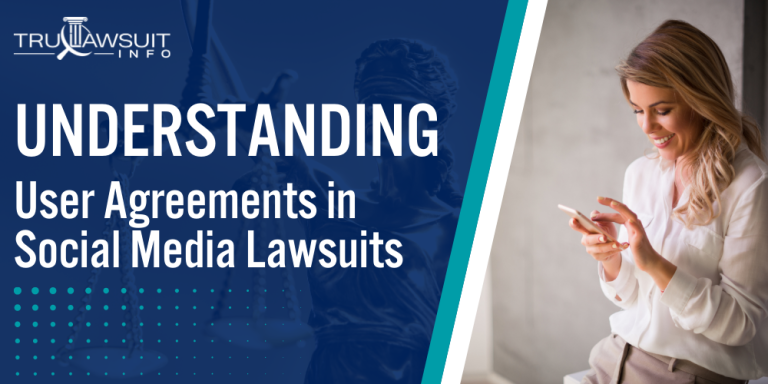
Intro to User Agreements in Social Media Lawsuits
Some of the key aspects of User Agreements in Social Media Lawsuits include, but are not limited to:
- Terms of Service: User agreements outline the terms and conditions that users must agree to in order to use the social media platform.
- Liability Waivers: Many user agreements include provisions that attempt to limit the liability of the social media company for harms suffered by users.
- Arbitration Clauses: Some user agreements require users to resolve disputes through arbitration, rather than in court.
- Choice of Law: User agreements may specify which state’s or country’s laws will govern any legal disputes.
If you have suffered harm due to the use of a social media platform, it’s crucial to carefully review the user agreement to understand your legal rights and options.
Contact TruLawsuit Info using the chat on this page for an instant case evaluation to find out if you qualify to join others filing social media harm lawsuits.
Table of Contents
The Role of User Agreements in Social Media
User agreements in social media are essential in defining the boundaries and expectations between the user and the platform.
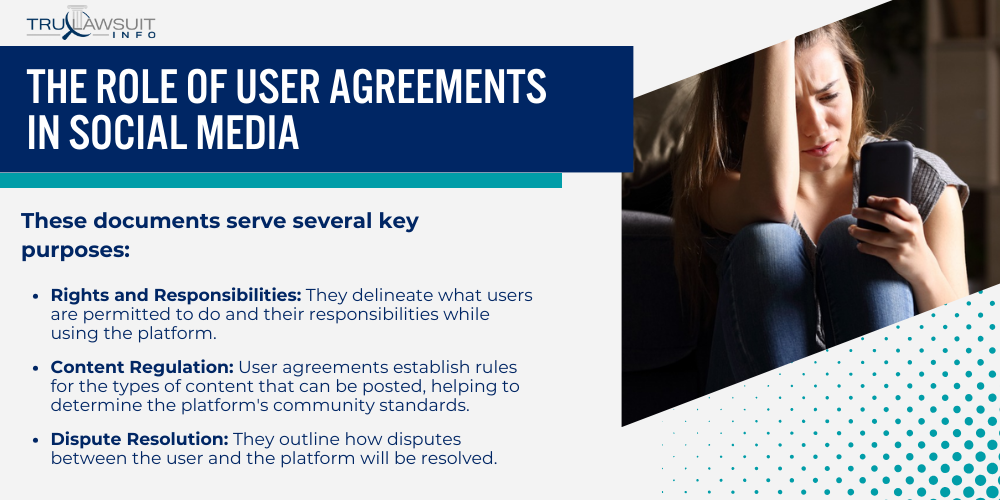
They form the backbone of the legal relationship, outlining rights as well as limitations.
Defining User Agreements and Their Purpose
User agreements are legally binding contracts that users must agree to before using a social media platform.
These documents serve several key purposes:
- Rights and Responsibilities: They delineate what users are permitted to do and their responsibilities while using the platform.
- Content Regulation: User agreements establish rules for the types of content that can be posted, helping to determine the platform’s community standards.
- Dispute Resolution: They outline how disputes between the user and the platform will be resolved.
- Service Changes: User agreements provide information on how changes in service, terms, or business practices will be communicated.
Through these agreements, social media platforms protect themselves legally while users gain an understanding of what is expected of them.
How User Agreements Govern User-Platform Relationships
User agreements are the foundation of the relational dynamics between the social media platform and its users.
They structure the legal relationship as follows:
- Access Permissions: The agreements grant permission to users to access the network’s services under certain conditions.
- Content Ownership: They often contain licensing agreements that specify ownership rights over content posted by other users.
- Behavior Guidelines: User agreements set forth policies to restrict users’ rights to post certain types of content or behave in certain ways on the platform.
- Termination Rights: They delineate circumstances under which the platform can terminate a user’s access to the services.
By agreeing to these terms, a user enters into a contractual relationship with the platform, which is enforced according to the service agreements.
Common Clauses in Social Media User Agreements
In social media lawsuits, user agreements often play a pivotal role.
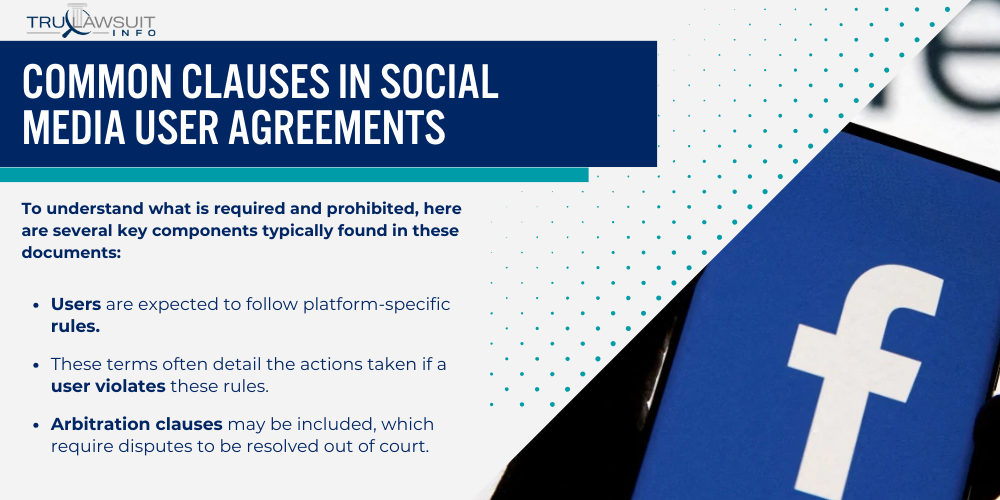
These agreements usually contain several standard clauses that dictate how users should interact with the platform and what the platform’s rights are in relation to the content.
Terms of Service and Acceptable Use Policies
Social media platforms establish guidelines through Terms of Service and Acceptable Use Policies.
These foundational elements dictate user behavior on the site.
To understand what is required and prohibited, here are several key components typically found in these documents:
- Users are expected to follow platform-specific rules.
- These terms often detail the actions taken if a user violates these rules.
- Arbitration clauses may be included, which require disputes to be resolved out of court.
- The terms will typically refer to applicable laws that govern the agreement.
Acceptable Use Policies ensure that platform interactions remain respectful and lawful.
Intellectual Property Rights and User-Generated Content
Intellectual property rights are a key focus in user agreements, as they assert the platform’s and users’ rights concerning user-generated content.
Here are several common stipulations found in such agreements:
- Social media companies typically claim a license to use, distribute, and display user content.
- Users maintain ownership rights over their own content but grant the platform certain rights.
- The clauses outline permissions given to the software provider for content use.
- They address how content is handled if it infringes on someone’s intellectual property.
In these user agreements, platforms lay out the legal framework for what is permissible and the scope of their authority over content shared by users.
Enforceability of User Agreements in Court
In assessing the enforceability of user agreements within the court system, courts scrutinize whether the agreements constitute a legally binding contract and the fairness of their terms.
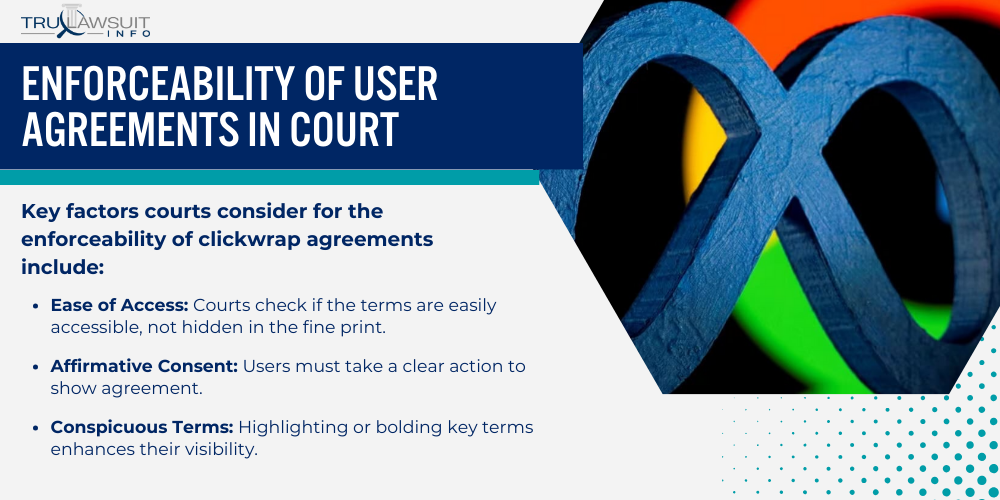
Clickwrap and Browsewrap Agreements
Clickwrap agreements require users to actively agree to the terms by clicking a button or checking a box.
Courts generally find these agreements to be enforceable contracts provided that the terms are presented clearly, and users have a fair opportunity to review them before assenting.
Key factors courts consider for the enforceability of clickwrap agreements include:
- Ease of Access: Courts check if the terms are easily accessible, not hidden in the fine print.
- Affirmative Consent: Users must take a clear action to show agreement.
- Conspicuous Terms: Highlighting or bolding key terms enhances their visibility.
- Prior Notice: If terms change, users should be promptly informed.
Browsewrap agreements don’t require explicit acceptance and hinge on the concept that continued use of a service implies consent.
Challenges with browsewrap agreements focus on the following areas:
- Courts are more hesitant to enforce browsewrap agreements if users could remain legally bound without actual knowledge of the terms.
- The placement and prominence of the terms affect enforceability.
- Some cases necessitate clear evidence that the user had notice of the agreement.
- E-commerce websites sometimes blend elements of clickwrap and browsewrap agreements, confusing the issue and customers.
Unconscionability and Adhesion Contracts
Contracts of adhesion, often employed by businesses with stronger bargaining power, can pose issues of unconscionability if they are overly one-sided.
Courts scrutinize several aspects of these contracts to assess their fairness, including:
- Plain language is vital to ensure users understand what they’re agreeing to.
- If terms are unconscionable, courts may refuse to enforce the contract.
- The presence of an arbitration clause can impede court involvement.
- Courts balance the interests of both parties, considering the business practices but prioritizing fair treatment.
The matter of enforceability hinges on the premise that the user had a fair chance to understand the terms to which they are bound.
The court system is equipped to identify and penalize unconscionable contracts that exploit users.
User Agreements in High-Profile Social Media Lawsuits
User agreements often lay the foundation for legal battles in high-profile lawsuits involving social media companies.
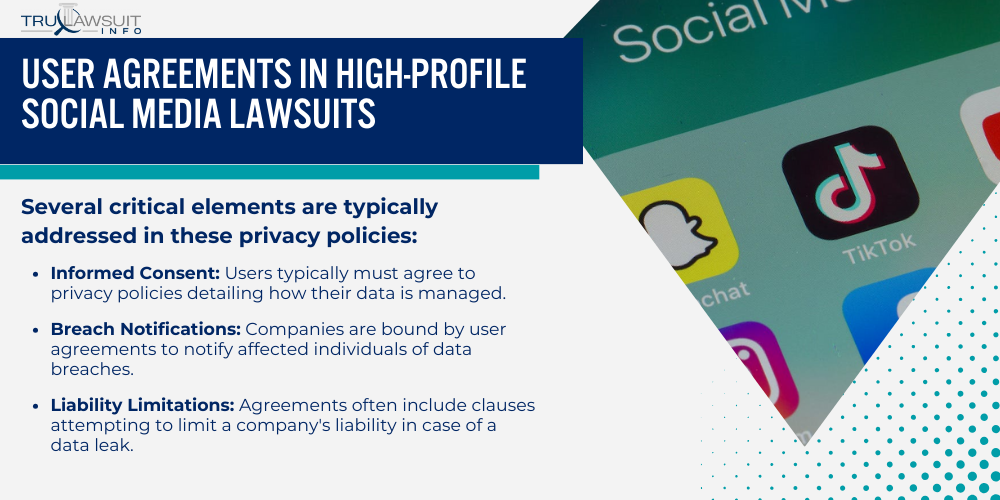
These documents detail how the company collects data and the extent to which the user agrees to content moderation policies.
Cases Involving Data Privacy and Security Breaches
Social media companies hold massive amounts of user data, which makes them prime targets for security breaches.
Legal cases scrutinize the privacy policies that users agree to, often questioning the adequacy of protection against unauthorized data access.
Several critical elements are typically addressed in these privacy policies:
- Informed Consent: Users typically must agree to privacy policies detailing how their data is managed.
- Breach Notifications: Companies are bound by user agreements to notify affected individuals of data breaches.
- Liability Limitations: Agreements often include clauses attempting to limit a company’s liability in case of a data leak.
- Legal Recourse: Users may pursue legal action if they believe a company has violated its privacy obligations.
Disputes Over Content Moderation and Censorship
The interpretation of user agreements comes into play when addressing accusations of inappropriate content and alleged censorship by social media platforms.
The following are key areas typically covered in user agreements related to content moderation:
- Content Policies: User agreements outline the type of content deemed inappropriate by the company.
- Moderation Rights: Agreements define the company’s rights to remove or restrict content.
- User Appeal Process: Some companies detail a process for users to appeal moderation decisions.
- Inconsistent Application: Questions arise when users allege a company’s policies are enforced inequitably.
In such disputes, businesses must balance moderating content with respecting users’ speech freedoms while adhering to legal standards outlined in user agreements.
Challenges in Interpreting User Agreements
In the dynamic world of social media, interpreting user agreements presents unique hurdles.
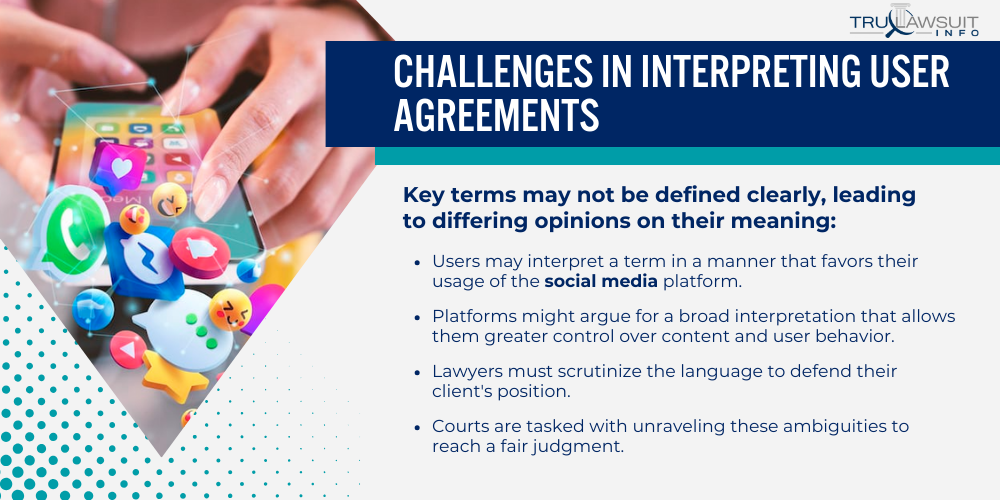
As users click “agree” often without reading the dense legal text and platforms constantly update their services and terms, courts and litigants face significant barriers to understanding and enforcing these documents.
Ambiguous Language and Conflicting Clauses
Ambiguous language in user agreements often leads to various interpretations, complicating the process of resolving disputes.
Key terms may not be defined clearly, leading to differing opinions on their meaning:
- Users may interpret a term in a manner that favors their usage of the social media platform.
- Platforms might argue for a broad interpretation that allows them greater control over content and user behavior.
- Lawyers must scrutinize the language to defend their client’s position.
- Courts are tasked with unraveling these ambiguities to reach a fair judgment.
The presence of conflicting clauses within the same agreement further muddles comprehension.
For example:
- One clause might grant users certain freedoms, while another imposes restrictions that seem to contradict those freedoms.
- The order of clauses can affect their interpretation; later clauses can be seen as overriding earlier statements.
- Jurisdictional variations can lead to conflicts where platforms operate globally but laws differ regionally.
- The inclusion of both clickwrap and scrollwrap agreements can lead to disputes over which the user actually agreed upon terms.
Evolving Nature of Social Media Platforms and Services
The evolving nature of social media platforms means that user agreements are regularly updated.
This can lead to challenges in maintaining a consistent understanding of the contractual relationship:
- Platforms may change features and policies, requiring updates to terms that may not be communicated effectively to users.
- New technologies, like developments in artificial intelligence and computer science, often prompt changes in user agreements to encompass new data use scenarios.
- Users who have agreed to a prior version of the terms may not be aware of their rights and obligations under updated agreements.
- Legal principles developed by institutions like York University may not keep pace with the rapid advancement of technology, leading to a lag in legal adaptability.
In conclusion, user agreements in the realm of social media encompass an intricate tapestry of language, interpretation, and technology that courts, lawyers, and users must navigate with care.
The inherent ambiguities and the agile nature of these services infuse an element of unpredictability in the pursuit of resolving legal disputes grounded in these crucial contracts.
Impact of User Agreements on User Rights
In the digital age, user agreements serve as the foundational documents outlining the relationship between social media platforms and their users.
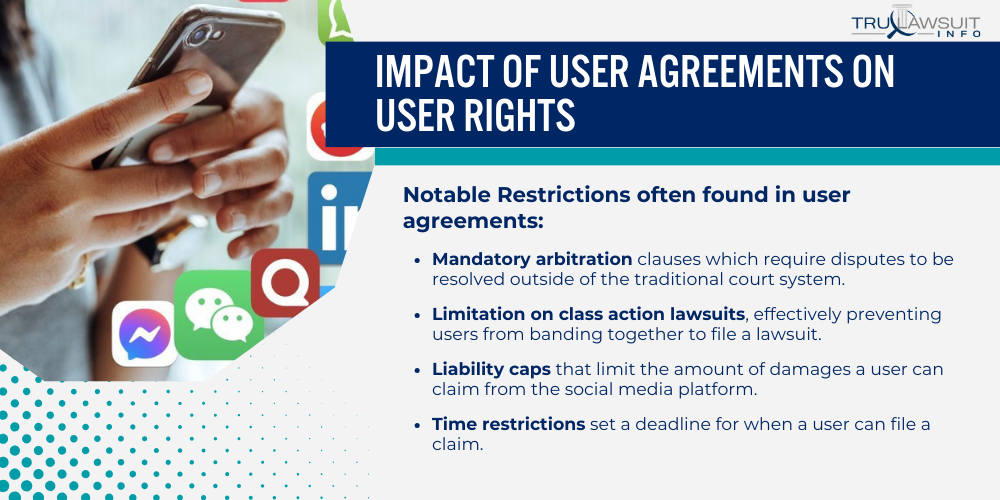
These documents often have significant implications for user rights, particularly in shaping legal interactions between individuals and services.
Limitations on Users’ Ability to Seek Legal Recourse
User agreements often include clauses that limit an individual’s ability to pursue legal recourse against a platform.
Notable Restrictions often found in user agreements:
- Mandatory arbitration clauses which require disputes to be resolved outside of the traditional court system.
- Limitation on class action lawsuits, effectively preventing users from banding together to file a lawsuit.
- Liability caps that limit the amount of damages a user can claim from the social media platform.
- Time restrictions set a deadline for when a user can file a claim.
- The requirement to follow specific procedural rules for disputes can deter users from filing lawsuits due to complexity or cost.
- Waivers of jury trial: Users agree to waive their right to a trial by jury if a dispute arises.
These provisions can make it challenging for users to access the legal system when they believe their rights have been violated.
Balancing Platform Liability Protection and User Interests
The legal framework surrounding social media platforms significantly affects the balance between protecting business interests and safeguarding user rights.
Key Factors in this Balance include:
- Service agreements typically contain Section 230 language that shields platforms from liability for user content.
- “Clickwrap” and “scrollwrap” agreements define the extent of platform liability and set terms of service.
- Court decisions influence the enforceability of user agreements and can shift the balance of power.
- User awareness of agreement terms often influences perceptions of fairness and willingness to engage with a platform.
- Efforts by platforms to update and communicate changes in agreements might affect user trust and platform accountability.
- Precedent from previous legal actions shapes future interpretations of user rights and platform responsibilities.
To protect their operations, social media companies draft service agreements that consider user rights while also preserving their own legal defenses.
Strategies for Navigating User Agreements
When interacting with software and services, users are often required to agree to terms that dictate their relationship with the company.
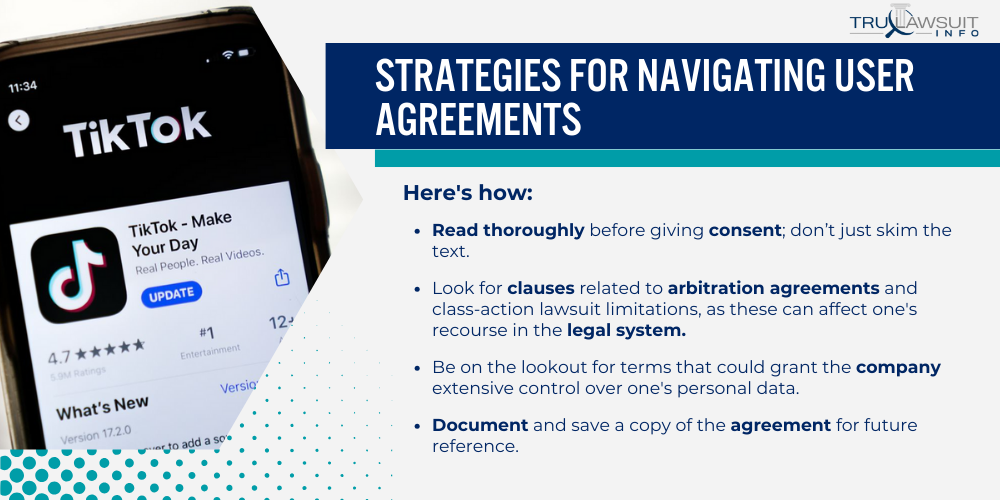
Best Practices for Users When Agreeing to Terms and Importance of Reviewing and Understanding User Agreements are essential to ensuring an informed decision and awareness of one’s rights and obligations.
Best Practices for Users When Agreeing to Terms
Users should approach online agreements with diligence and caution.
Here’s how:
- Read thoroughly before giving consent; don’t just skim the text.
- Look for clauses related to arbitration agreements and class-action lawsuit limitations, as these can affect one’s recourse in the legal system.
- Be on the lookout for terms that could grant the company extensive control over one’s personal data.
- Document and save a copy of the agreement for future reference.
Informing oneself about the full extent of the licensing agreement helps ensure that there are no surprises later.
Importance of Reviewing and Understanding User Agreements
Business practices may often include terms that could impact the user’s rights.
To effectively manage your interactions with services and products, consider the following actions:
- Identify key sections that pertain to user data and privacy.
- Understanding these terms empowers users to make informed decisions.
- Recognize how agreements can change and what that means for you.
- By staying aware, one maintains the necessary information to hold the company accountable.
For users, taking these strategic steps when agreeing to terms is part of the responsible use of technology and online services.
The Future of User Agreements in Social Media
The landscape of social media is evolving, with user agreements at the epicenter of this transformation.
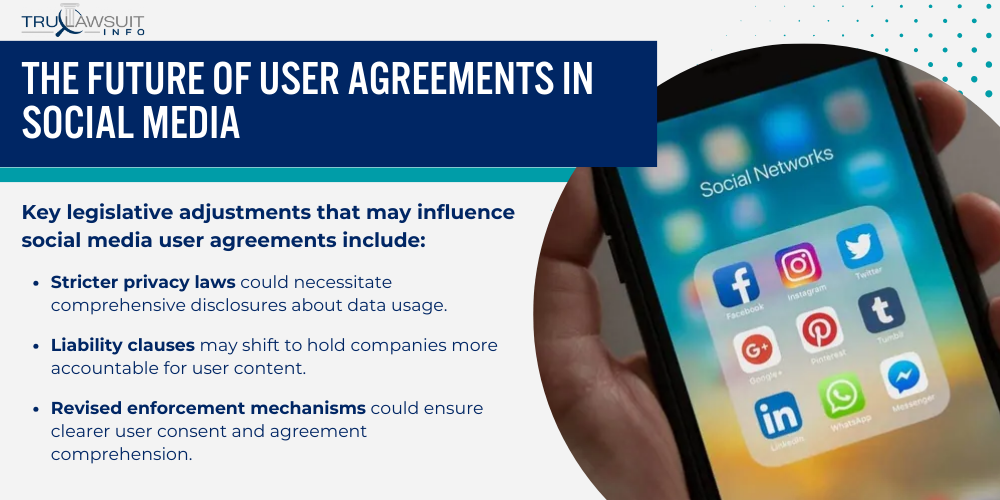
As legal frameworks adapt and new trends emerge, the manner in which companies draft and enforce these agreements will be pivotal.
Potential Changes in Legislation and Regulation
The legal environment surrounding social media is in flux, with legislators and regulatory bodies looking to implement changes that could redefine the use and scope of user agreements.
Key legislative adjustments that may influence social media user agreements include:
- Stricter privacy laws could necessitate comprehensive disclosures about data usage.
- Liability clauses may shift to hold companies more accountable for user content.
- Revised enforcement mechanisms could ensure clearer user consent and agreement comprehension.
- Transparency requirements might compel platforms to disclose algorithmic decision-making processes.
These foreseeable alterations will likely restructure how social media companies engage with users and manage data within their platforms, with a strong emphasis on user privacy and platform accountability.
Emerging Trends and Developments in User Agreements
The rapid advancement of technology, particularly in fields like artificial intelligence (AI) and e-commerce, calls for user agreements to adapt accordingly.
Notable developments influencing the structure of user agreements entail:
- Incorporation of AI governance addressing ethical use and biases in algorithms.
- Expansive definitions of intellectual property rights in the age of user-generated content.
- Development of modular agreements providing users with more granular control over their data.
- Integration of dynamic contracting that reflects real-time interactions and transactions.
As social media continues to interlace with business practices and e-commerce, the importance of precise and anticipatory user agreements magnifies.
They must be resilient and flexible enough to accommodate the swift pace of changes in computer science and software applications, all while ensuring the companies remain within legal bounds and preserve user trust.
Trulawsuit Info: #1 Social Media Lawsuits
In the evolving landscape of digital law, user agreements play a pivotal role in social media lawsuits. Such lawsuits are predominantly aimed at tackling issues arising from the use of social media platforms.
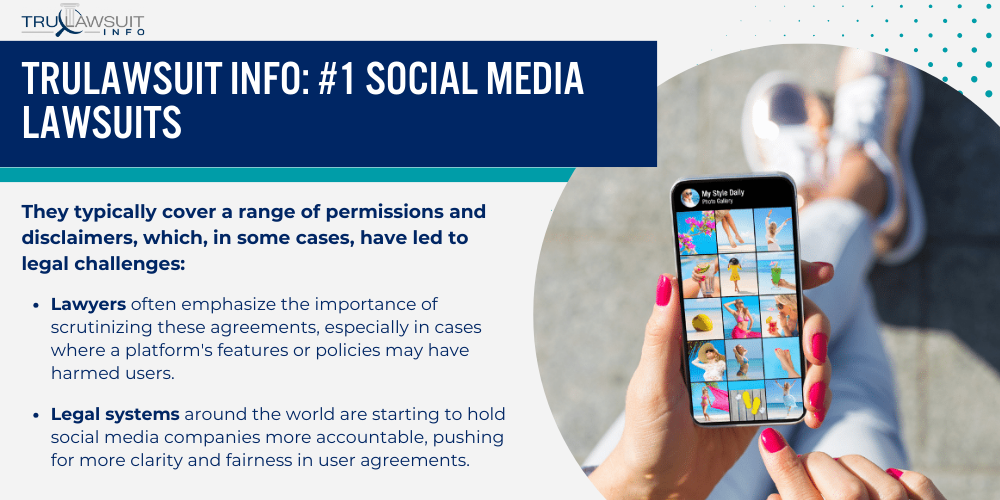
They often bring into question the level of transparency and consent provided by the user agreements that individuals accept without a thorough understanding of the implications.
User agreements on social media platforms are extensive and dense, making it challenging for users to grasp the full extent of the terms.
They typically cover a range of permissions and disclaimers, which, in some cases, have led to legal challenges:
- Lawyers often emphasize the importance of scrutinizing these agreements, especially in cases where users may have been harmed by a platform’s features or policies.
- Legal systems around the world are starting to hold social media companies more accountable, pushing for more clarity and fairness in user agreements.
- The enforcement and interpretation of these agreements can vary significantly, leaving much to be determined by judicial proceedings.
- Negotiations and settlements in social media harm lawsuits may hinge on the specific language and clauses within user agreements.
It is important to note that revising user agreements to ensure better protection for the users is an ongoing concern.
The legal community closely monitors these developments, focusing on user rights and the responsibilities of social media companies.
Frequently Asked Questions
-
What are the enforceable elements of a social media user agreement in a lawsuit?
In a lawsuit, the enforceable elements of a social media user agreement typically include privacy policies, intellectual property rights, user behavior guidelines, and dispute resolution mechanisms.
These components are binding as long as they comply with relevant laws and regulations.
-
How does a user agreement differ from terms of service on social media platforms?
A user agreement serves as an enforceable contract between the user and the platform, outlining rights and responsibilities, while the terms of service govern the rules and regulations for using the platform.
Although similar, the terms of service focus more on the proper use of the service and the platform’s liabilities.
-
What key points should be included in a social media user agreement template?
Key points to include in a social media user agreement template are data usage policies, user conduct expectations, copyright and license grants, account termination conditions, and liability limitations.
These points provide clarity on both the user’s and the platform’s rights.
-
Are there any limitations to the legal binding nature of social media user agreements?
Yes, the binding nature of social media user agreements is limited by provisions that are contrary to public policy or illegal terms.
Also, unconscionable clauses or those not made clear to the user may not be enforceable.
-
How can individuals understand their rights under a social media platform's user agreement policy?
Individuals can understand their rights under a social media platform’s user agreement policy by reviewing the agreement carefully, seeking clarifications on unclear terms, and consulting legal resources or professionals.
Staying informed about changes to the agreement is also crucial.
-
In what circumstances can an individual sue a social media company based on breaches of the user agreement?
An individual can sue a social media company for breach of the user agreement if the company fails to protect personal data as promised, unlawfully terminates an account, or violates terms regarding content ownership and usage rights.
However, each case depends heavily on the specific terms of the user agreement and applicable laws.

Experienced Attorney & Legal SaaS CEO
With over 25 years of legal experience, Jessie is an Illinois lawyer, a CPA, and a mother of three. She spent the first decade of her career working as an international tax attorney at Deloitte.
In 2009, Jessie co-founded her own law firm with her husband – which has scaled to over 30 employees since its conception.
In 2016, Jessie founded TruLaw, which allows her to collaborate with attorneys and legal experts across the United States on a daily basis. This hypervaluable network of experts is what enables her to share reliable legal information with her readers!
Have A Case?
Here, at Tru Lawsuit Info, we’re committed to helping victims get the justice they deserve.
To do this, we actively work to connect them with attorneys who are experts in litigating cases similar to theirs.
Would you like our help?
Tru Lawsuit Info is a reliable source of information about issues that may affect your health and safety, such as faulty products, data breaches, and environmental hazards.
Our team of experienced writers collaborates with medical professionals, lawyers, and advocates to produce informative articles, guides, and other resources that raise awareness of these topics.
Our thorough research provides consumers with access to reliable information and updates on lawsuits happening around the country. We also can connect consumers with attorneys if they need assistance.
Camp Lejeune's water contamination issue spanned several decades starting in the 1950s. Exposure to these chemicals has been linked to various serious health issues, including cancer, organ diseases, and death.
Research is increasingly suggesting a link between the use of Tylenol during pregnancy and the development of neurodevelopmental disorders, such as autism and ADHD, in infants.
Legal action is being taken against manufacturers of Aqueous Film-Forming Foam (AFFF), a chemical used in fighting fires. The plaintiffs allege that exposure to the foam caused health issues such as cancer, organ damage, and birth and fertility issues.
Have A Case?
Here, at Tru Lawsuit Info, we’re committed to helping victims get the justice they deserve.
To do this, we actively work to connect them with attorneys who are experts in litigating cases similar to theirs.
Would you like our help?







